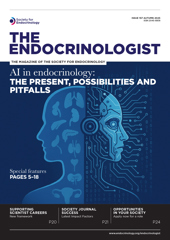Artificial intelligence (AI) is no longer a futuristic concept – it is actively reshaping how we deliver healthcare today. For those of us working in specialist roles within endocrinology, AI offers both exciting opportunities and real-world challenges. From streamlining clinical documentation to improving multidisciplinary collaboration, the potential of AI is increasingly evident across the system.
From a nursing perspective, particularly within long-term condition management, the value of AI lies in its ability to reduce cognitive and administrative load, allowing nurses to refocus on the human aspects of care that remain irreplaceable. However, it is also essential that AI is adopted thoughtfully, ethically and inclusively – with nursing voices at the heart of its development and deployment.
TIME RECLAIMED FOR PATIENTS
'...the value of AI lies in its ability to reduce cognitive and administrative load, allowing nurses to refocus on the human aspects of care that remain irreplaceable.'
One of the most immediate and tangible benefits I have experienced in clinical practice is the use of AI-powered transcription tools during endocrine outpatient clinics. These tools use ambient voice recognition to transcribe and structure consultation notes in real time. I have worked with such systems first-hand and observed a notable improvement in workflow.
Previously, much of my clinical time was spent documenting patient interactions after the consultation – either by typing or dictating notes. This process was time-consuming, often delayed the generation of clinic letters, and added to end-of-day fatigue. With AI transcription support, letters can be drafted automatically during the consultation and refined quickly afterwards.
This change has freed up time for direct patient interaction, especially important in endocrine nursing where consultations often involve emotional support, lifestyle counselling and education.
SUPPORTING THE WIDER TEAM
What is perhaps less frequently discussed – but equally important – is the positive impact on the administrative workforce. In our service, clinic letters previously required secretarial support to transcribe from dictations or handwritten notes. Now, because the AI generates a structured, editable output during the appointment, admin teams can copy and paste content directly into patient records or templates, with minimal formatting or correction required.
This shift has led to measurable time savings and reduced transcription errors. It has also allowed administrative colleagues to redirect their time towards other vital tasks, such as appointment co-ordination, pathway tracking and dealing with patient queries – all of which are critical to maintaining an efficient outpatient service.
ENHANCING MULTIDISCIPLINARY CARE
In endocrinology, patient care is inherently multidisciplinary. Patients with conditions such as hypopituitarism, thyroid disease, or adrenal insufficiency are often under the shared care of endocrinologists, endocrine nurses, neurosurgeons, oncologists, and primary care providers. In this environment, clear and timely documentation is essential.
AI-generated clinical notes help ensure that letters are structured, legible, and include key information in a consistent format. This consistency supports safer prescribing, clearer care plans, and more reliable follow-up.
A TOOL, NOT A REPLACEMENT
While the benefits of AI are real, it’s important to maintain perspective. AI is not a replacement for clinical expertise, nor should it be treated as a “black box” that makes decisions for us. The clinical reasoning, empathy, and relationship-building that underpin nursing practice cannot be replicated by an algorithm. The synergy between AI and human nursing care is crucial, where technology supports the work of nurses without replacing their compassion and empathy (Mohanasundari et al., 2023).
AI can support and extend our capabilities, but it should not deskill or dehumanise our work (Nuffield Council on Bioethics, 2018). Nurses are trained to pick up subtle cues, assess the emotional and psychological dimensions of illness, and respond with sensitivity to individual needs. These are things no machine can replicate.
LOOKING AHEAD: FUTURE PROSPECTS OF AI IN ENDOCRINOLOGY
While current applications such as transcription and clinical coding are already in use, the future of AI in endocrinology holds even more promise.
We may see AI used increasingly for predictive risk modelling—such as identifying patients at higher risk of adrenal crisis, deterioration in diabetes control, or thyroid dysfunction (EYES 2022). AI algorithms trained on large datasets may also help interpret complex biochemical profiles or imaging in pituitary and thyroid disease (Rajkomar et al., 2019).
For patients, AI tools such as mobile health apps, symptom trackers, and virtual coaching platforms could provide more timely feedback and a sense of control over chronic conditions. These tools may ultimately empower patients while supporting more dynamic models of care. These innovations have been highlighted in the NHS England - fit for future 10 year plan. The NHS is uniquely positioned to harness the transformative potential of artificial intelligence and genomic science. This plan sets out a pathway for establishing the NHS as a global leader in healthcare innovation. (DofH 2025) Importantly, these innovations will require digital health literacy among clinicians and patients. Nurses have a crucial role to play in bridging the digital divide, ensuring that new tools enhance equity and accessibility. By embracing AI, nurses, and health care institutions can harness its potential to enhance nursing practice, improve patient care, and shape the future of healthcare. (Rony et al 2023).
There is a growing need for nurses to lead in digital health strategy (RCN 2023). As AI is embedded into clinical pathways, the nursing perspective will be critical in shaping solutions that are safe, usable, and truly patient-centred.
FINAL REFLECTIONS
AI is not a solution, but it is a powerful enabler. In endocrinology where patients often live with chronic and multifaceted conditions the opportunity to reduce administrative burden and improve care coordination is significant.
Deploying AI in healthcare presents a range of challenges and potential drawbacks. Key concerns include algorithmic errors and biases, lack of transparency in decision-making i.e black box, patient privacy risks, legal and ethical complexities, potential skill degradation due to over-reliance, high implementation costs, and resistance to change within the healthcare system. To realise the benefits of AI while addressing these issues, robust design, thorough testing, and effective regulation are essential (Mohanasundari et al., 2023).
From a nursing perspective, AI has already begun to shift how we work. It offers time back for what matters most: human connection, clinical thinking, and responsive care. However, its value depends entirely on how it is implemented. If nurses are part of that conversation and innovation (RCN 2024) AI can truly enhance both patient outcomes and professional practice.
KATHRYN KINSELLA
Endocrine Specialist Nurse, Salford Royal Hospital, Northern Care Alliance NHS Foundation Trust
REFERENCES AND FURTHER READING
Aronson, J.K., 2022. When I use a word... Too much healthcare—technology. BMJ, 378. Available at: https://doi.org/10.1136/bmj.o2102
European Young Endocrinologist and Scientists, 2022. Issue 15, Autumn. Available at: https://www.ese-hormones.org/media/1bojl4l0/eyes-news-2022-_autumn-issue-15_web-final.pdf
Giorgini, F., Di Dalmazi, G. and Diciotti, S., 2024. Artificial intelligence in endocrinology: a comprehensive review. Journal of Endocrinological Investigation, 47(5), pp.1067–1082. Available at: https://doi.org/10.1007/s40618-023-02235-9
Mohanasundari, S.K., Kalpana, M., Madhusudhan, U., Vasanthkumar, K., B R, Singh, R., Vashishtha, N. and Bhatia, V., 2023. Can Artificial Intelligence Replace the Unique Nursing Role? Cureus, 15(12), p.e51150. Available at: https://doi.org/10.7759/cureus.51150
NHS England, 2023. Accelerating AI in Health and Care: Results from the NHS AI Lab. Available at: https://www.england.nhs.uk/long-read/planning-and-implementing-real-world-ai-evaluations-lessons-from-the-ai-in-health-and-care-award
Nuffield Council on Bioethics, 2018. Artificial Intelligence in Healthcare and Research. Available at: https://www.nuffieldbioethics.org/wp-content/uploads/Artificial-Intelligence-AI-in-healthcare-and-research-1.pdf
Rajkomar, A. et al., 2019. Machine learning in medicine. New England Journal of Medicine. Available at: https://doi.org/10.1056/nejmra1814259
RCN Congress, 2024. The Evolution of AI in Health Care. Available at: https://www.rcn.org.uk/congress/congress-events/the-evolution-of-ai-in-health-care-2024
Royal College of Nursing, 2023. Digital Nursing. Available at: https://www.rcn.org.uk
Rony, M.K., Parvin, M.R. and Ferdousi, S., 2023. Advancing Nursing Practice with Artificial Intelligence: Enhancing Preparedness for the Future. Nursing Open, 11(1). Available at: https://doi.org/10.1002/nop2.2070
Topol, E., 2019. Deep Medicine: How Artificial Intelligence Can Make Healthcare Human Again. New York: Basic Books.
UK Government, 2025. Fit for the future: 10 Year Health Plan for England - Executive Summary (Accessible Version). Available at: https://www.gov.uk






